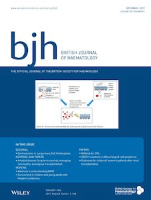
BRITISH JOURNAL OF HAEMATOLOGY
Scope & Guideline
Exploring Innovations in Blood Health and Disease
Introduction
Aims and Scopes
- Clinical Trials and Treatment Efficacy:
The journal frequently publishes results from clinical trials and observational studies that assess the efficacy and safety of new treatments for haematological malignancies, including novel agents like CAR T-cell therapies, targeted therapies, and immunotherapies. - Transfusion Medicine and Blood Disorders:
Research on transfusion practices, complications, and management of blood disorders such as sickle cell disease, thalassaemia, and immune thrombocytopenia is a core focus area, addressing both clinical and logistical aspects of transfusion medicine. - Molecular and Genetic Insights:
The journal emphasizes studies that explore the molecular and genetic basis of haematological diseases, including the impact of specific mutations on prognosis and treatment response, integrating genomics with clinical outcomes. - Patient-Centered Outcomes:
There is a strong emphasis on patient-reported outcomes and quality of life assessments in patients with haematological conditions, highlighting the importance of treatment impact on patients' daily lives. - Guidelines and Best Practices:
The journal serves as a platform for disseminating guidelines and consensus statements from leading haematology societies, ensuring that practitioners have access to the latest recommendations for diagnosis and management.
Trending and Emerging
- Novel Immunotherapies and CAR T-Cell Therapies:
There is a growing body of research focused on innovative immunotherapies, particularly CAR T-cell therapies, which are being extensively studied for their efficacy in treating various haematological malignancies. - Real-World Data and Observational Studies:
An increasing number of publications emphasize the importance of real-world evidence and observational studies, providing insights into treatment effectiveness and patient outcomes in everyday clinical settings. - Genomic and Precision Medicine:
Research into genomic profiling and precision medicine is on the rise, with studies exploring how genetic mutations and biomarkers can inform tailored treatment approaches for individual patients. - Impact of COVID-19 on Haematology Patients:
The journal has seen a surge in studies assessing the impact of COVID-19 on patients with haematological conditions, including the effects on treatment protocols and patient outcomes. - Patient-Centric Research and Quality of Life Studies:
There is an emerging trend towards research that prioritizes patient perspectives, including quality of life assessments and patient-reported outcomes, recognizing the importance of holistic care in managing haematological diseases.
Declining or Waning
- Traditional Chemotherapy Approaches:
There has been a noticeable decline in publications focused solely on traditional chemotherapy regimens for haematological malignancies, as the field increasingly shifts towards targeted therapies and immunotherapies that promise improved outcomes. - Longitudinal Studies of Established Therapies:
Research on the long-term outcomes of established therapies such as older chemotherapeutic agents has decreased, likely due to the emergence of new treatment modalities that attract more research interest. - Generalized Studies Without Specific Focus:
There appears to be less emphasis on broad, generalized studies that do not target specific haematological conditions or interventions, as the field gravitates towards more precise and targeted research. - Classic Transfusion Practices:
Although transfusion medicine remains a significant area of focus, the exploration of classic transfusion practices is waning, with more attention being given to innovative transfusion strategies and technologies. - Historical Perspectives on Haematology:
Papers focusing on historical aspects of haematology or retrospective analyses of outdated treatments are becoming less common, indicating a shift towards contemporary research that addresses current challenges.
Similar Journals
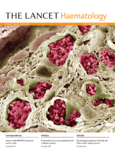
Lancet Haematology
Shaping the landscape of hematology with impactful findings.Lancet Haematology, published by Elsevier Science Ltd in the United Kingdom, is a premier peer-reviewed journal dedicated to advancing the field of hematology. With an impressive impact factor and listed in the Q1 category in hematology for 2023, this journal ranks #4 out of 137 in the Scopus database, boasting a 97th percentile indicating its influential role in disseminating high-quality research. Since its establishment in 2014, Lancet Haematology has provided a vital platform for researchers and clinicians to share groundbreaking studies, innovative treatment approaches, and novel therapeutic discoveries relevant to various hematological disorders. The journal does not operate under an open access model, but it offers multiple access options to facilitate engagement with its content. By bridging clinical practice and cutting-edge research, Lancet Haematology aims to foster the advancement of knowledge and improve patient outcomes in hematology, making it an essential read for professionals, researchers, and students alike.
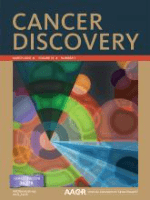
Cancer Discovery
Uncovering Innovations in Cancer BiologyCancer Discovery, published by the American Association for Cancer Research, stands as a vital resource in the oncological research community, renowned for its commitment to disseminating groundbreaking studies and innovative findings in cancer biology, prevention, diagnostics, and treatment. With a significant impact factor reflecting its esteemed position, this journal facilitates open discussions and collaborations, striving to bridge the gap between experimental and clinical research. The journal, which has been active since 2011, is classified as a Q1 publication in 2023, underscoring its influence and authority in the realm of Oncology. By providing a platform for rigorous peer-reviewed articles, Cancer Discovery aims to advance our understanding of cancer and enhance therapeutic strategies, making it an indispensable tool for researchers, professionals, and students eager to stay at the forefront of cancer research.

HemaSphere
Empowering innovation in blood science research.HemaSphere, published by WILEY, stands at the forefront of hematology research, offering a vital platform for the dissemination of cutting-edge findings in the field. Since its inception in 2017 and official transition to Open Access in 2018, the journal has positioned itself as a leading conduit for high-impact research, maintaining a prestigious Q1 quartile ranking in the Hematology category as of 2023. Addressed in the United States at 111 River St, Hoboken, NJ, HemaSphere aims to foster a global dialogue among researchers, clinicians, and students by providing unrestricted access to high-quality content that encompasses clinical and experimental advancements. With an array of engaging articles, reviews, and commentaries, HemaSphere contributes significantly to the advancement of hematology, ensuring that critical knowledge is readily accessible to enhance patient care and innovative research. To explore the latest developments and breakthroughs in this dynamic field, we invite scholars, professionals, and students to engage with HemaSphere and elevate their understanding of hematologic science.
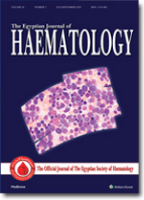
Egyptian Journal of Haematology
Pioneering Knowledge in Hematologic Malignancies and CareThe Egyptian Journal of Haematology, published by WOLTERS KLUWER MEDKNOW PUBLICATIONS, stands as a pivotal resource in the field of hematology, particularly within the context of Egypt and the broader Middle Eastern region. This journal is dedicated to disseminating high-quality research that explores the latest advancements in blood disorders, hematologic malignancies, and transfusion medicine. With a focus on original research, case studies, and reviews, it aims to provide a comprehensive platform for hematologists, researchers, and healthcare professionals to enhance their understanding and management of hematological conditions. Although it is not an open-access journal, the rigorous peer-review process ensures that only the most impactful studies are published, contributing to the journal's reputation in the academic community. The Egyptian Journal of Haematology serves as an essential tool for advancing knowledge, improving clinical outcomes, and fostering collaboration among experts in the field.
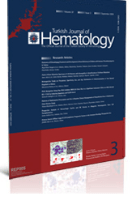
Turkish Journal of Hematology
Championing open access to vital hematology knowledge.Turkish Journal of Hematology is an esteemed publication dedicated to advancing the field of hematology, producing influential research since its inception in 1999 under the auspices of GALENOS PUBL HOUSE. With an Open Access model, it facilitates widespread dissemination of knowledge, allowing researchers, clinicians, and students to stay abreast of the latest developments in blood disorders and treatments. With an ISSN of 1300-7777 and an E-ISSN of 1308-5263, the journal holds a commendable position in the academic community, evidenced by its 2023 Q3 ranking within the hematology category and its standing at #80 out of 137 in the Scopus database, placing it in the 41st percentile. Covering a wide scope of topics within hematology, this journal serves as a critical resource for disseminating innovative research and clinical practices pertinent to the ongoing challenges faced in this vital area of medicine. With its continuous publication until 2024, Turkish Journal of Hematology remains a beacon for enhancing the understanding and treatment of hematological conditions within the Turkish and global medical communities.
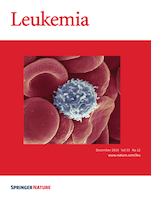
LEUKEMIA
Advancing the Frontiers of Hematology and OncologyLEUKEMIA, published by SpringerNature, is a premier journal in the field of hematology and oncology, with ISSN 0887-6924 and E-ISSN 1476-5551. Established in 1987, this esteemed publication serves as a critical platform for disseminating groundbreaking research and comprehensive reviews on the pathophysiology, diagnosis, and treatment of leukemia and related hematological disorders. With a distinguished impact, it holds a top-tier status in several categories, including Q1 rankings in Anesthesiology and Pain Medicine, Cancer Research, Hematology, and Oncology for 2023. The journal is globally recognized for its rigorous peer-review process and is highly regarded among academia, evidenced by its impressive Scopus rankings—7th in Hematology and 24th in Oncology. Researchers, clinicians, and students alike will benefit from the rich content that this journal offers, making it an invaluable resource in the fight against leukemia. The main objective of LEUKEMIA is to advance knowledge and encourage further innovations within the field, ensuring that vital insights reach practitioners and researchers around the world.
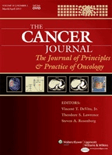
CANCER JOURNAL
Exploring New Frontiers in Cancer Mechanisms and Therapies.CANCER JOURNAL is a leading peer-reviewed publication dedicated to the dissemination of innovative research in the fields of cancer research and oncology. Published by Lippincott Williams & Wilkins, this journal serves as an essential resource for researchers, clinicians, and students seeking to advance their understanding of cancer mechanisms, treatment strategies, and patient care. With an ISSN of 1528-9117 and an E-ISSN of 1540-336X, it boasts a respectable 2023 Q2 category ranking in both Cancer Research and Oncology, reflecting its impactful contributions to the scientific community. Although it currently does not offer open access, the journal's rigorous peer-review process ensures the publication of high-quality, relevant studies that stimulate further investigation and collaboration among professionals. Since its inception, the journal has evolved through several converged years, maintaining a steadfast commitment to addressing the complexities of cancer biology and treatment. At its core, CANCER JOURNAL aims to foster advancements in oncology, making it a vital platform for sharing pivotal findings that could transform cancer research and therapeutic practices.
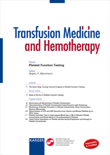
TRANSFUSION MEDICINE AND HEMOTHERAPY
Exploring breakthroughs in hemotherapy and patient care.TRANSFUSION MEDICINE AND HEMOTHERAPY, published by KARGER, is a prominent journal dedicated to advancing the fields of hematology and transfusion medicine. With an ISSN of 1660-3796 and E-ISSN 1660-3818, this esteemed journal has been a valuable resource for researchers and clinicians since its inception in 1973, with significant publication phases continuing into 2024. It currently holds a Q2 ranking in Hematology and a Q3 ranking in Immunology and Allergy, reflecting its impact and relevance in these critical fields. The journal features original articles, reviews, and clinical studies, presenting cutting-edge research that aids in the development of effective therapies and enhances patient care. Open access options are available, ensuring that crucial findings are accessible to a broad audience. As an important platform for dialogue and advancement in transfusion science, TRANSFUSION MEDICINE AND HEMOTHERAPY supports the global health community's efforts to improve treatment outcomes and foster innovation in medical practices.

INTERNATIONAL JOURNAL OF HEMATOLOGY
Navigating the Future of Blood Health ResearchThe INTERNATIONAL JOURNAL OF HEMATOLOGY, published by SPRINGER JAPAN KK, serves as a critical platform for advancing research in the field of hematology. With a prestigious history spanning over three decades from 1991 to 2024, this journal is recognized for its impactful contributions, evidenced by its Q2 category ranking in Hematology for 2023, and its notable position at rank #71 out of 137 in the Scopus Medicine Hematology category. Researchers and professionals within the hematology community benefit from the journal's rigorous peer-reviewed articles that cover a wide range of topics, including clinical studies, basic research, and novel therapeutic strategies. Though currently non-open access, it provides essential insights and findings to an audience passionate about the latest advancements in blood disorders and treatments. Situated in Japan, the journal not only showcases high-quality research but also fosters a global exchange of knowledge in hematology, making it a significant resource for scholars, practitioners, and students alike.
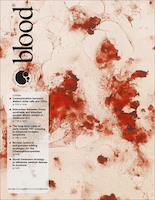
BLOOD
Shaping the Future of Hematological Discovery.BLOOD, published by the American Society of Hematology, is a premier peer-reviewed journal in the fields of Biochemistry, Cell Biology, Hematology, and Immunology. With an impressive impact factor and ranking in the top quartiles (Q1) across multiple disciplines, BLOOD is essential reading for researchers and professionals seeking to stay updated on the latest advancements in hematology and related fields. The journal has been a cornerstone of hematological research since its inception in 1946, providing a platform for rigorous scientific inquiry and discourse. Its commitment to publishing high-quality original research, comprehensive reviews, and insightful editorials makes it a vital resource for students, practitioners, and scientists alike. By offering exceptional access to influential publications, BLOOD continues to shape the future of hematology and enhance understanding of blood-related disorders, marking its vital role in advancing both basic and clinical research.